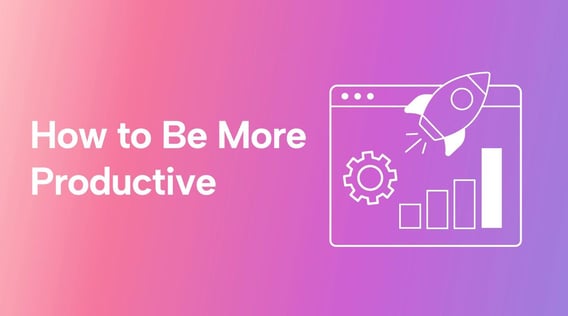How do other people finish their work in four hours when you’re not even halfway done in six? What’s their secret?
They’re probably really good at being productive.
The good news is that anyone can improve their productivity. And we’re about to show you how.
We’ve created the ultimate productivity guide with 11 useful tips, as well as skills that can help you be more productive and reach your potential in no time.
What is productivity, anyway?
The notion of productivity arose over a century ago as an economic concept — think, the Industrial Revolution and its accompanying mass production processes.
Businesses became focused on measuring individual and team output against fixed parameters, such as the number of pieces produced per hour or minute. This measuring allowed them to optimize their production processes and turn a profit in the marketplace.
And that's how most modern businesses still look at it. They measure the productivity of an individual or team against a set of valuables, such as the number of items (cars, cans of soup, paperclips, microchips, emails, Facebook ads, you name it) produced within a given time frame.
The personal productivity idea
As industrialization conquered the world, the notion of productivity spilled over As industrialization conquered the world, the notion of productivity spilled over from people's work environments into their private lives.
Like it or not, we now assess our success in life — at least, to a large extent — through the lens of how productive we are both at work and in our home environment.
This drive for productivity does help us get a lot out of life, but it can also make us feel like we’re aiming for ever-shifting goalposts.
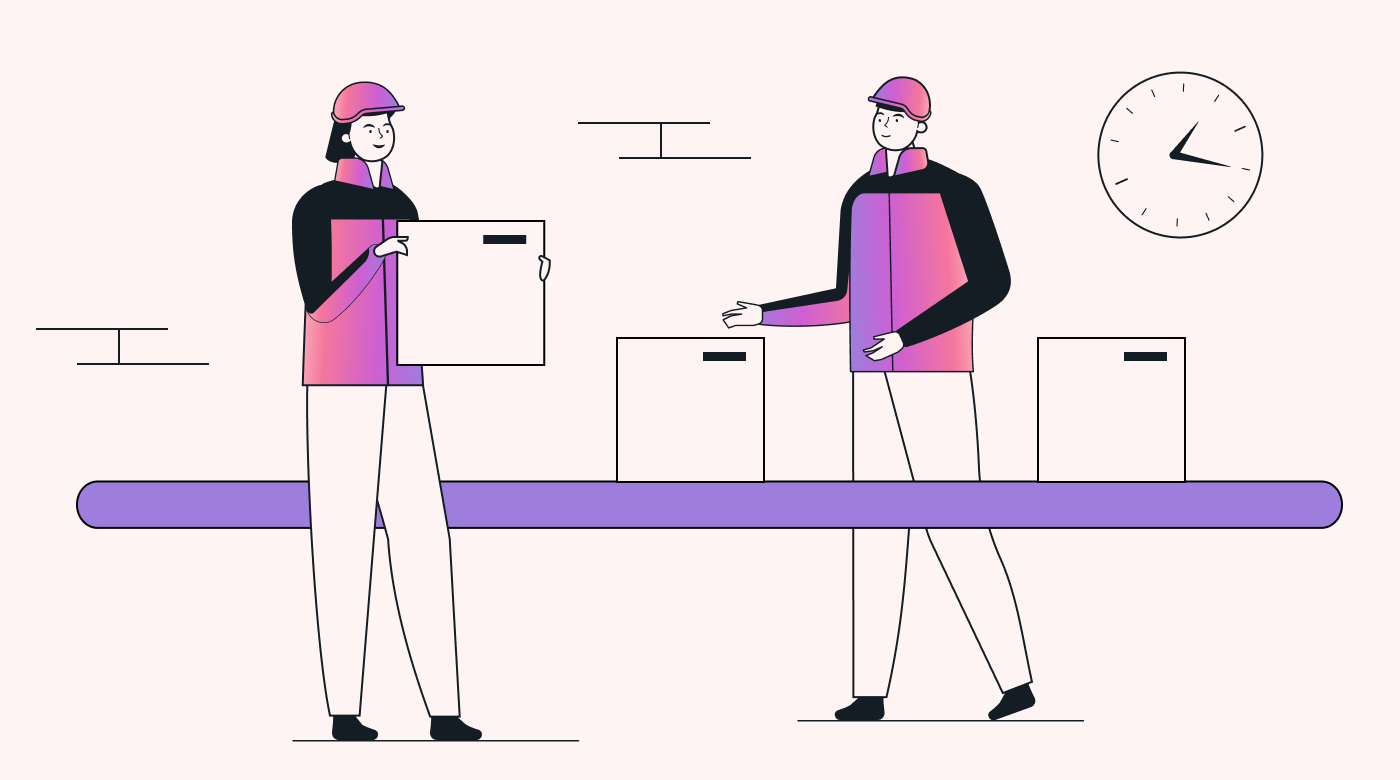 |
That's where productivity tools and techniques come in. Mastering productivity hacks and using them both at home and work can help you carve out quality time and make your life more enjoyable and meaningful.
Productivity skills and techniques
Here's a dirty little secret: we're not as productive as we think, especially at work.
One study found that, across all job areas, workers are only productive for 60% of each day, on average. And office workers experience the worst distractions: They're productive for only two hours and 23 minutes daily. Ouch!
Below you'll find 11 practical tips and six skills to get you organized and your productivity humming.
And then, we'll share the "secret sauce" that’s the key to productivity — it'll turn productivity from an endless chore into a rewarding, fulfilling experience.
11 tips for maintaining productivity
Increasing your productivity comes down to shifting your mindset and adopting good habits. These 11 tips are a great place to start transforming your productivity level:
1. Set daily goals
If you’ve ever looked back on your day and wondered what you’ve accomplished, then chances are you haven’t prioritized correctly. And if you don’t know how or what to prioritize, then you probably don’t have a goal to pursue.
So, why not set one now?
In fact, set one daily. What do you want to accomplish by the end of each day? How will this move your business or career forward?
The tasks you perform every day should contribute to your future success. If you’re moving toward your future goals, then you’re going to feel more accomplished — which is key to keeping your momentum going and getting the most out of the rest of these productivity tips.
2. Make a to-do list
One popular way to plan your day is to make a to-do list.
It’s super easy — all you need is a pen and paper. Or you can go digital with one of the numerous to-do-list apps out there. No matter what method you choose, it feels really good when you cross an item off your list of tasks. Ah, the sweet, sweet taste of victory.
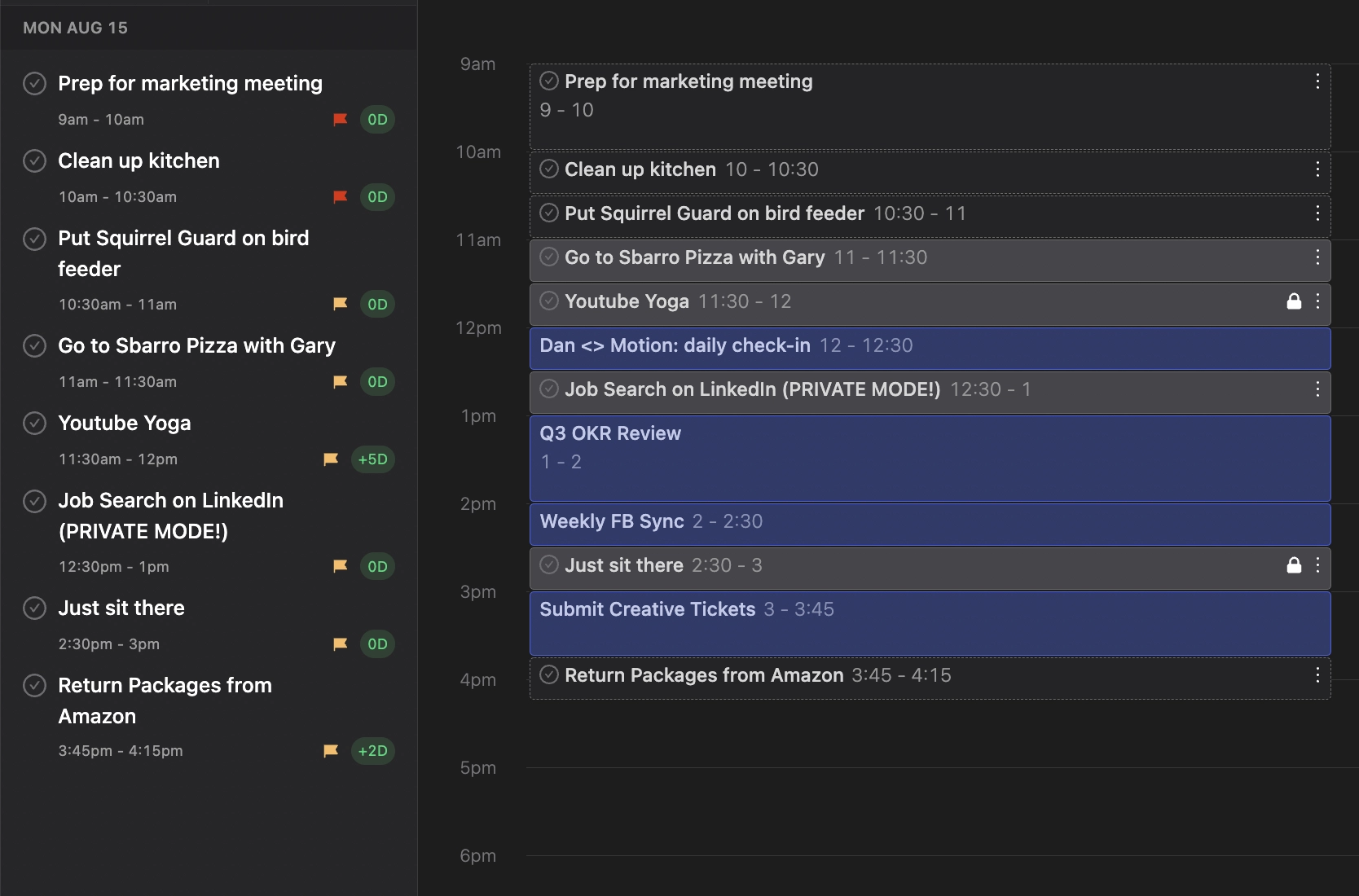 |
But while to-do lists are a great way to get organized, we have something even better. Something that’ll get you organized without you having to do any of the heavy lifting. To read more about this, check out our article, “Stop Using To-Do List Apps Like Todoist, TickTick, and Any.do. Here’s Why.”
3. Prioritize and delegate
To get things done, you have to know which tasks to do first and which ones can wait. That’s where prioritization comes in.
There are many ways to prioritize. Some use the Pareto Principle (a.k.a. the 80/20 rule), while others use the Eisenhower Matrix. You can also sort tasks into groups based on their importance — high, medium, or low.
Do the most pivotal tasks first, and, if possible, delegate low-priority tasks and responsibilities that don't require your personal attention. This will free up valuable time and allow you to concentrate on more critical tasks.
4. Batch your tasks
Task batching is when you take similar tasks and dedicate a specific time in your schedule to doing them all together. This removes the urge to multitask and helps you focus since you’re not jumping from project to project.
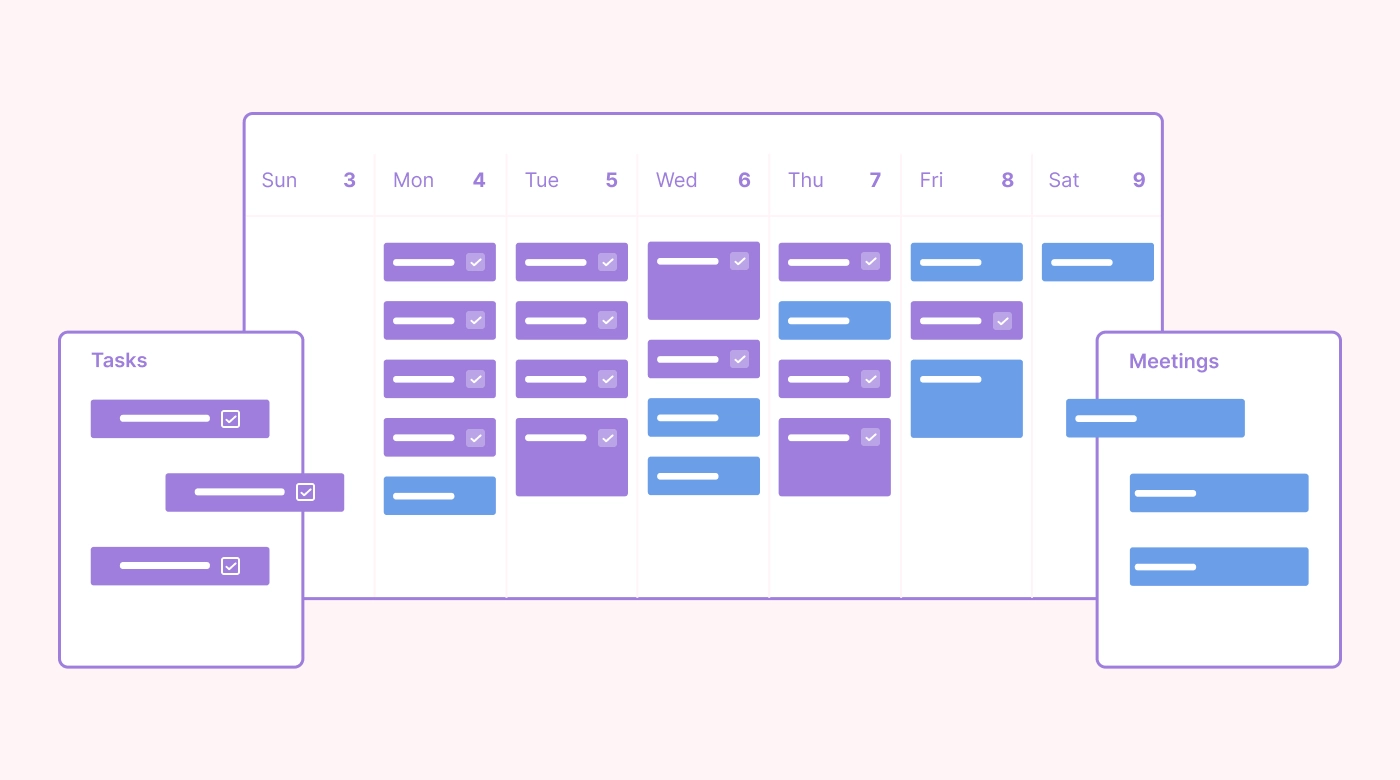 |
To batch your tasks, break down bigger projects into smaller ones and group them based on their similarities. For example, replying to emails and returning phone calls can be grouped together because both involve communication.
You can also batch your tasks by how much focus they need and schedule them according to when you’re most alert during the day. For example, you might want to batch all your tasks that require high concentration in the morning if that’s when you’re most productive.
Moderate-concentration tasks can be scheduled after your lunch break, and those that need minimal concentration can be done at the end of the day.
5. Block out time on your schedule
You won’t get anything done unless you carve out some time for it, so assign each important task to a block of time in your schedule. Time blocking involves allocating specific blocks of time for dedicated work on predetermined tasks or projects.
Motion takes time blocking to a whole new level. It reserves large parts of your schedule for deep work and, if anything changes, reshuffles your schedule for you.
Time blocking goes hand-in-hand with timeboxing, a productivity method where you set limits for the amount of time you'll spend on each task. This technique can help keep you from investing excessive time in one activity, and it also encourages efficient use of your available hours.
6. Use productivity apps
Productivity strategies are all about working smarter, not harder. And what better way to work smart than by using a productivity app?
 |
Productivity apps are designed to streamline your workflow, improve your focus, block out distractions, and help you work more efficiently. But be careful not to overdo it. Constantly switching between productivity tools can slow you down. This is why we recommend a tool that has all the bases covered.
Motion is a calendar, project manager, task manager, and meeting assistant all rolled into one convenient package.
7. Stop procrastinating with the 2-minute rule
Procrastination is a top productivity killer. Are you a chronic procrastinator or easily overwhelmed by everything you have to do on a workday? Try using the 2-minute rule.
If you can do something in two minutes or less, just do it — right now, at this very moment. If you can’t do it in two minutes and it’s not important, then you have two choices: either delegate it to someone else or store it away for later.
With Motion, you can create this task, label it with the appropriate priority level, and assign it to yourself or a team member. Motion will automatically add it to your (or their) schedule.
8. Eat the frog
The “eat the frog” time management method flows from the idea that if you eat a live frog first thing in the morning, nothing worse can happen to you the rest of the day. Your “frog” is your biggest, most unpleasant, or hardest task of the day — often the one you procrastinate on the most.
So, if you’re most productive earlier in the day, tackle your most daunting task in the morning. That way, you’ll ensure that the task doesn’t hang over your head, draining your mental resources.
9. Automate repetitive manual tasks
Are there tasks you perform repeatedly that don’t add any value to your work? If so, try automating them. Automation makes a huge difference in your daily schedule by freeing up time for you to complete your truly valuable work.
Motion can automate task management, saving you tons of planning time. Our algorithms prioritize your tasks for you and add them to your schedule. And when things change — as they inevitably will — it’ll shuffle them around for you.
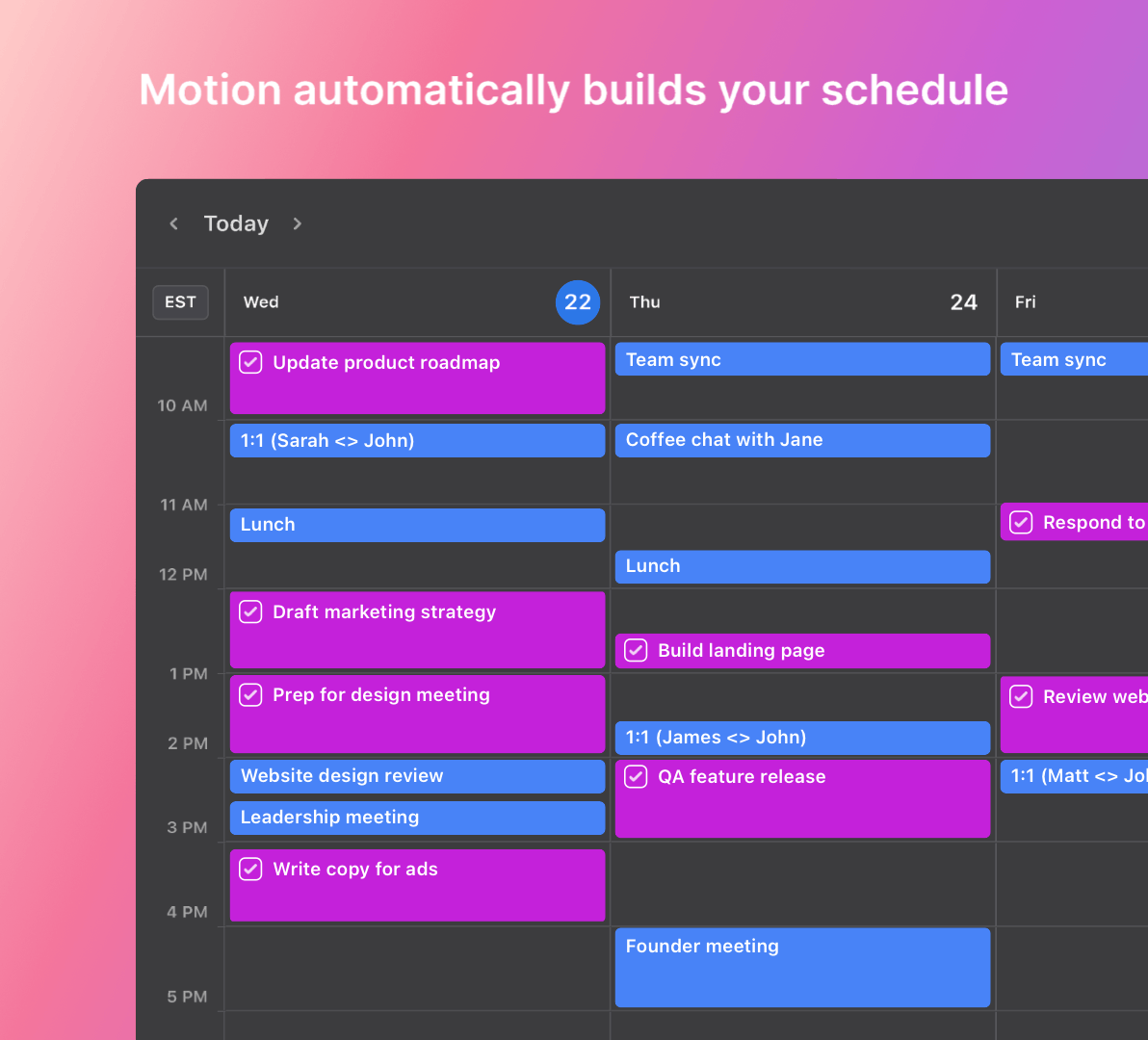 |
10. Practice mindfulness
Mindfulness is the intentional practice of being fully present in the current moment without passing judgment.
Practicing mindfulness not only helps you laser focus but also reduces stress. So, when your mind starts to wander off, whether it’s worrying about tight deadlines or nitpicking the last project you completed, gently nudge yourself back to the here and now.
You’ll emerge from this mindful moment with a fresh perspective, ready to tackle the task at hand with newfound clarity and composure.
11. Create a routine
Did you know that people who have a consistent morning routine earn an additional $12,500 annually compared to those who don’t? A morning routine gives you the chance to set your intentions for the day.
If you’re not a morning person, just find the most productive time of your day and create your routine around that.
Related: Morning Routines: 14 Ways Successful People Start The Day
6 skills you can work on to become more productive
After you’ve implemented the above tips, you can shift your focus to building skills that support a productive life.
1. Planning skills
Planning skills are important for mapping out every aspect and phase of a project or task.
They help you become more productive because they give you a roadmap to the end goal, and you won't be thrown off course or slowed down if unforeseen issues pop up.
 |
- Understand a project thoroughly before starting it. Make sure you grasp its purpose, scope, and objectives. Ask questions, conduct research, and clarify uncertainties.
- Choose a planning tool tailored to your thinking style, whether it's a spreadsheet, a whiteboard, a mind map, or another method that organizes your thoughts well.
- Break down large tasks into smaller, manageable pieces. This can make your most dreaded task feel like an achievable task. Take the time to map them out in project management software. Tackle each component individually to avoid getting overwhelmed.
- Set realistic, achievable milestones to maintain your motivation and track your progress. Celebrate each accomplishment, however minor, as a step toward your ultimate goal.
- Identify your most productive time of day. Schedule your most important tasks for your peak productivity hours. You can focus on less cognitive-demanding tasks, such as checking your emails, for the rest of the day.
2. Decision-making skills
Well-honed decision-making skills allow you to make accurate, timely decisions. They enable you to analyze options and weigh the pros and cons quickly, helping you be more productive because you won't waste time due to indecisiveness, half-hearted decisions, unclear solutions, or fear of making a mistake.
- Be clear about the precise issue that requires a decision, and collect all the pertinent information. A comprehensive understanding lays the foundation for well-informed choices.
- Distinguish facts from subjective opinions — including your own. Recognize that opinions may stem from incomplete information or biases and can hinder optimal decision-making. Always go for the facts!
- Evaluate alternatives and weigh the pros and cons. List all possible options and objectively assess the advantages and disadvantages of each. This systematic approach facilitates sound, balanced decision-making and reduces bias and error.
- Communicate decisions clearly to the affected parties. Once a decision is made, convey it unambiguously to everyone impacted by it. It's often best to do this in writing. Clear communication provides understanding and leads to better collaboration and implementation of decisions.
3. Problem-solving skills
Problem-solving skills focus on finding solutions to a spectrum of problems.
Honing these skills can help you identify and analyze problems, come up with innovative solutions, and implement effective new strategies.
Problem-solving skills help improve your productivity because they guide you in dealing effectively and in a timely manner with problems that could have otherwise derailed your productivity.
- Listen actively to people who report problems. Try to understand their perspectives and capture important information.
- Research all aspects of a given problem before you attempt a solution. This will prevent time from being lost to unsuccessful trial-and-error solutions.
- Evaluate all potential solutions. Note their pros and cons, and select the solution that'll solve the most aspects within an acceptable time frame.
- Be creative and think outside of the box. Ask "What if…" questions, and give yourself permission to explore problems from different angles.
- Approach problems as opportunities rather than obstacles. It's easy to get upset by problems, but just have a good laugh and treat them as stepping stones to new skill development.
4. Concentration skills
Concentration skills will help improve your productivity because you'll be able to shut out distractions for focused periods of time.
 |
- Use the Pomodoro Technique. Set a timer for 25-minute intervals of focus time with short, 5-minute breaks in between. After three rounds, take a longer break.
- Stop multitasking. When you think you’re multitasking, you’re actually switching between tasks. Task switching places more demand on your brain and increases your chances of making mistakes. To complete tasks quickly and increase your accuracy, focus on one task at a time. Motion can display a subtle banner on your screen, nudging you to stay focused on your current task.
- Recharge with brief, regular breaks. Breaks rejuvenate your mind and refocus your attention. You can stretch, relax, get yourself a cup of coffee, or engage in a quick, enjoyable activity.
- Set boundaries. If you want to be productive, you need to know how to say no to tasks that don’t contribute to your goals.
- Minimize potential disruptions by silencing email notifications and activating the "Do Not Disturb" mode on your phone. Create a calm, organized workspace to foster productivity and concentration.
- Follow the five-minute rule. Commit to spending only five minutes on tempting distractions or tasks that trigger procrastination. This'll help you to stay on track and keep going.
5. Critical thinking skills
Critical thinking skills give you the ability to objectively evaluate situations. They help you consider different perspectives and analyze information accurately.
With these skills, you can gain a holistic view of your projects or tasks, identify potential obstacles, anticipate challenges, and make informed decisions.
Ultimately, critical thinking skills improve your productivity because you can work faster and in a more focused way when you have a holistic view of your project or task.
- Ask relevant questions to gain a comprehensive understanding of the task at hand. Think of questions like "What is the ultimate goal of this project?" Or, "What are the main elements and supportive components of this project?" Answering these questions will uncover key details and requirements that are necessary for successful task completion.
- Collect background information so you can see the project's context. This, in turn, will enable informed decision-making and help you align your efforts with your overarching goals.
- Think through a task in its entirety before starting it. This allows for better planning and organization, reduces potential setbacks, and increases efficiency.
- Consider alternatives that could get the job done better or faster. Discuss them with your project supervisor before starting on the task.
- Discuss the project with a superior while it's still in the conceptual stage. Be proactive if you see a possible problem down the road to avoid complications later in the process.
- Periodically analyze the project's outcomes and results before taking the next steps. Use your experiences with the current phase of the project to streamline future actions.
6. Communication skills
Communication skills reflect the ability to communicate your thoughts clearly, succinctly, and effectively.
They help you become more productive because they prevent time wasted on confusion, misunderstandings, and wrong assumptions.
In fact, effective communication in the workplace can generate a 25% increase in productivity. On the flip side, about 70% of corporate mistakes can be attributed to poor communication!
 |
- Tailor your communications to the desired outcomes. Identify the goals you hope to achieve through each interaction and adjust your spoken or written communication accordingly for clarity and effectiveness.
- Organize your thoughts and plan your key messages before speaking or writing. This promotes concise communication and aids in comprehension.
- Put yourself in the other person's shoes. Imagine yourself as the recipient of your own message, and ask yourself whether you would understand what you're being asked about or told to do. (You'll be amazed at how much you assume…) Then refine your communication accordingly.
- Be professional in your communication. Use a courteous and respectful tone in your spoken and written interactions. Professionalism fosters credibility and promotes a positive work environment in which things simply flow more smoothly.
- Pay attention to your communication's emotional and intellectual dimensions. Share accurate, relevant information, and don't make assumptions — ask clarifying questions instead. Display empathy and consider the impact of your words on others. And always make sure your body language matches your words.
And now, time for the secret sauce: a healthy dose of heart!
As you can see, the right skills and techniques can significantly boost your productivity at both work and home. However, even the best skills won't help if you're not motivated to use them.
That's where the secret sauce comes in:
Pour your heart into everything you do. This is the secret to productivity that'll give you the intrinsic motivation to consistently produce at your very best.
 |
When starting a task, look for the aspects of the task that most inspire you. Visualize the end result and the people who'll be positively impacted by what you do.
As you work on a task or project, keep those beneficiaries in mind. This will help you stay motivated, feel happier, and become your most productive self — whether you're in the office or at home.
Ready to be more productive?
Increasing your productivity at work or at home doesn't have to be overwhelming or unattainable.
Start by identifying specific skill sets in which you could use some fine-tuning, such as communication skills, critical thinking skills, or any of the other skills discussed in this article.
Then, select productivity tips and techniques for the skill sets you want to work on and start practicing them, whether in the workplace or in your private projects at home. Even small changes will make a big difference in how well you use your time and energy.
Plus, to keep track of your productivity in an organic, fun way, consider Motion's AI-powered time and project management platform, the better alternative to to-do list apps that'll save you two hours each day — so you can do more of your favorite, productive things!
If you'd like to give Motion a try, grab a 7-day free trial here.

Liz is a graphic designer turned content marketer specializing in SaaS, project management, and brand marketing. Besides her passion for writing, Liz cares for her animals on a smallholding in rural Cumbria.
